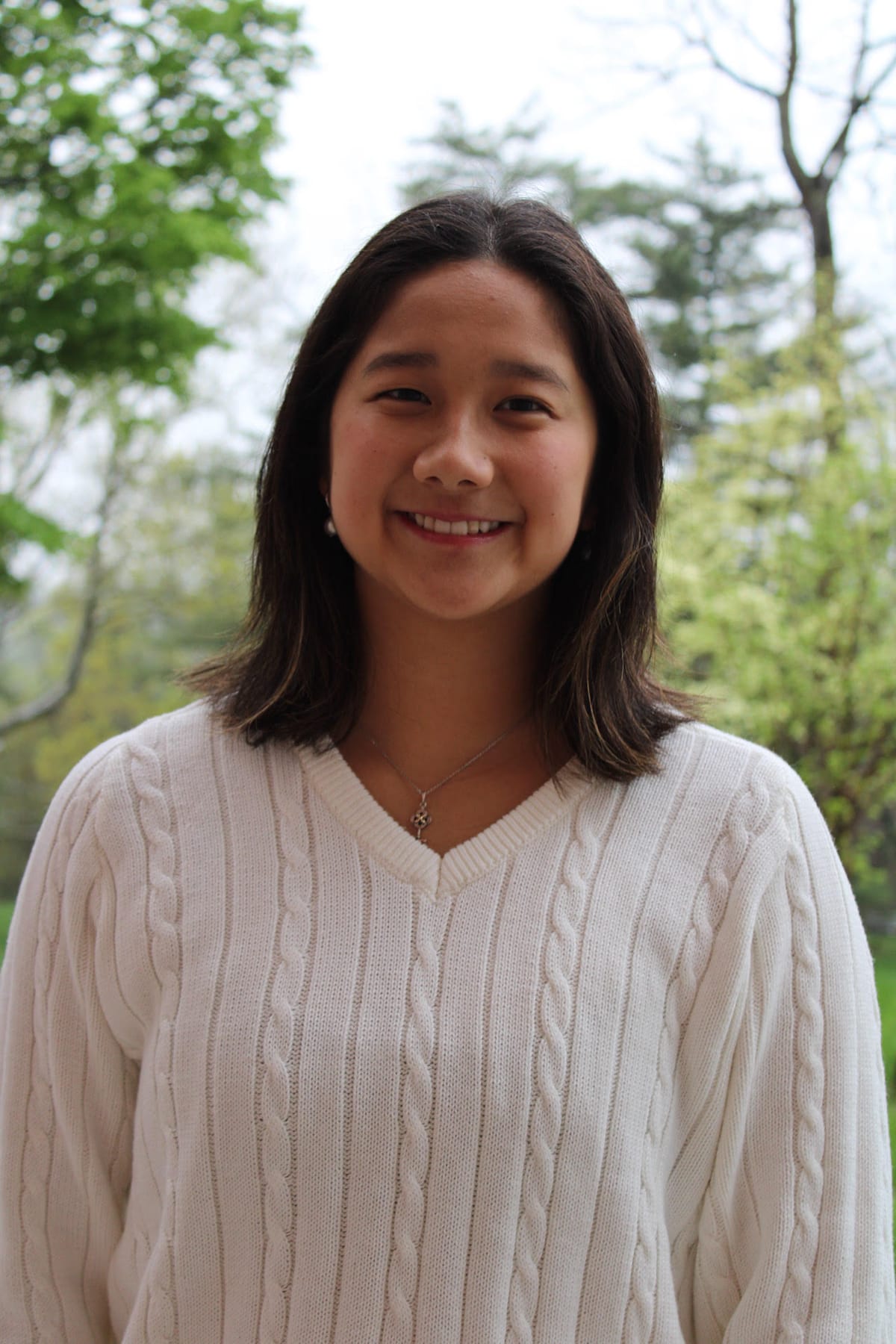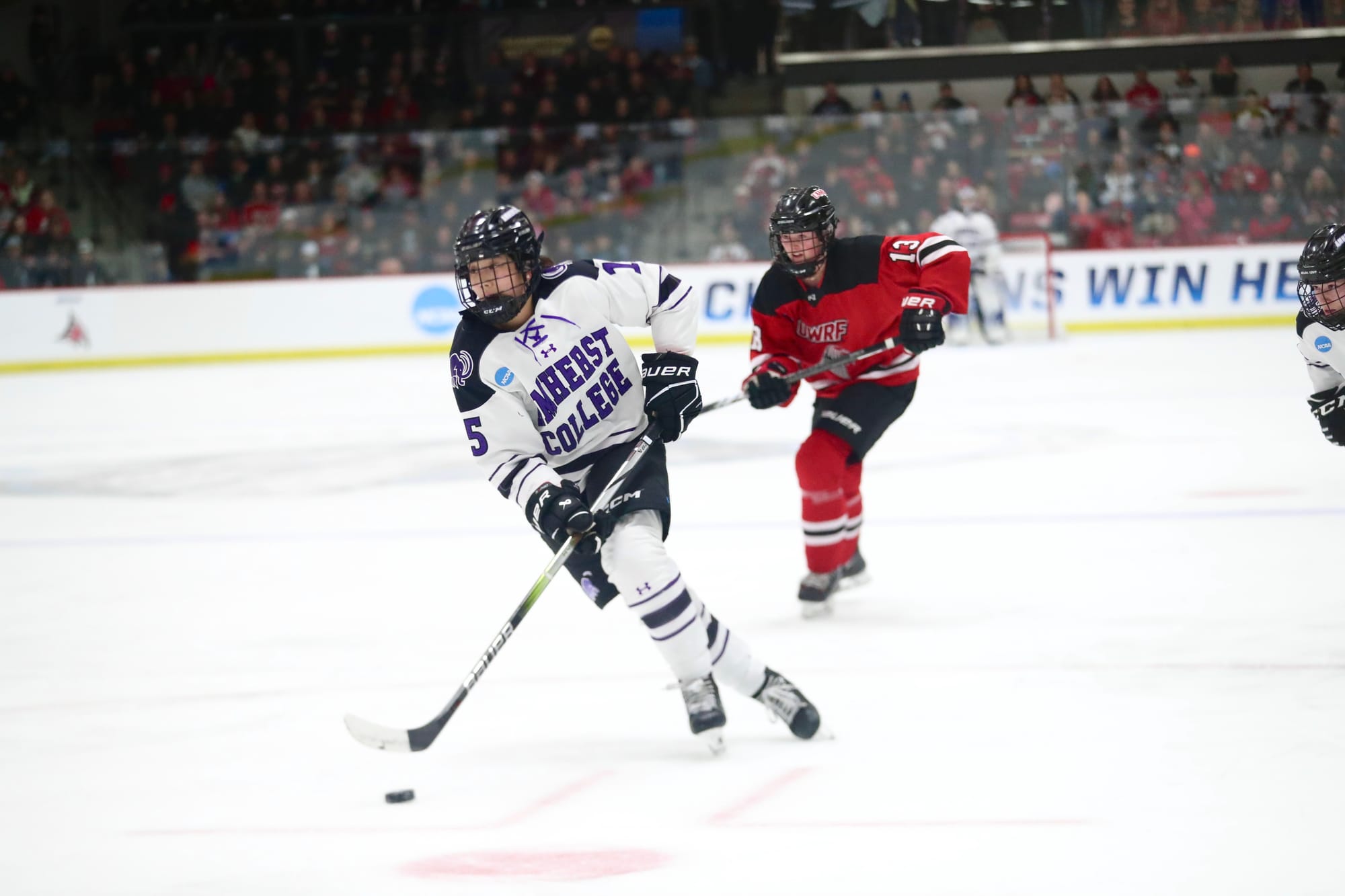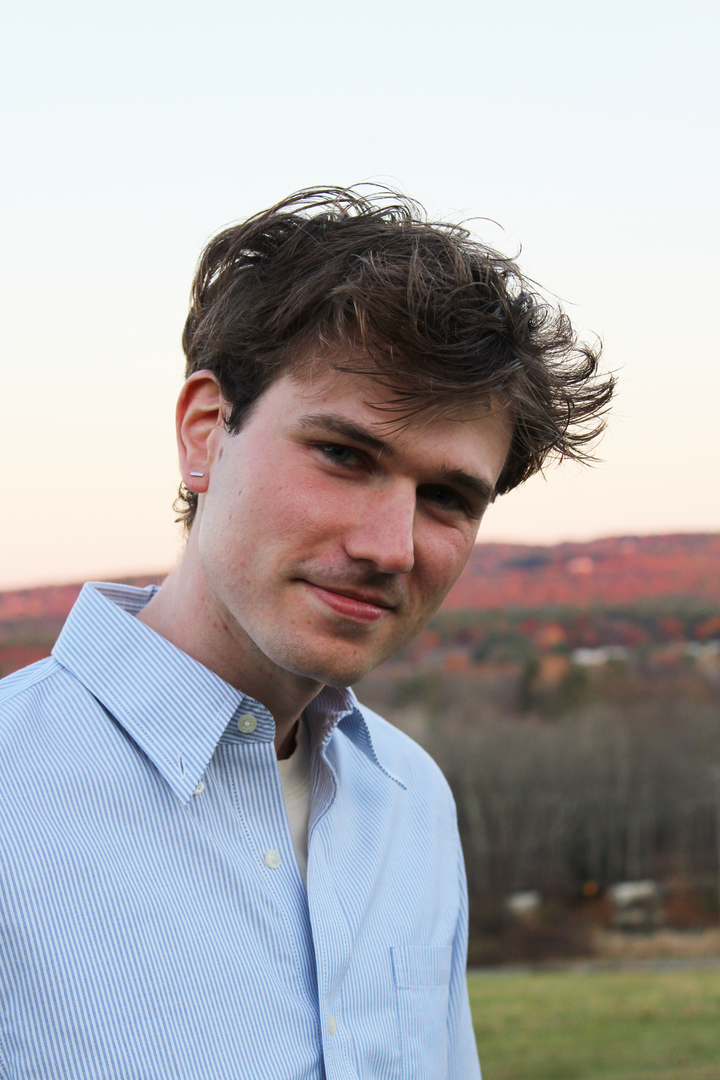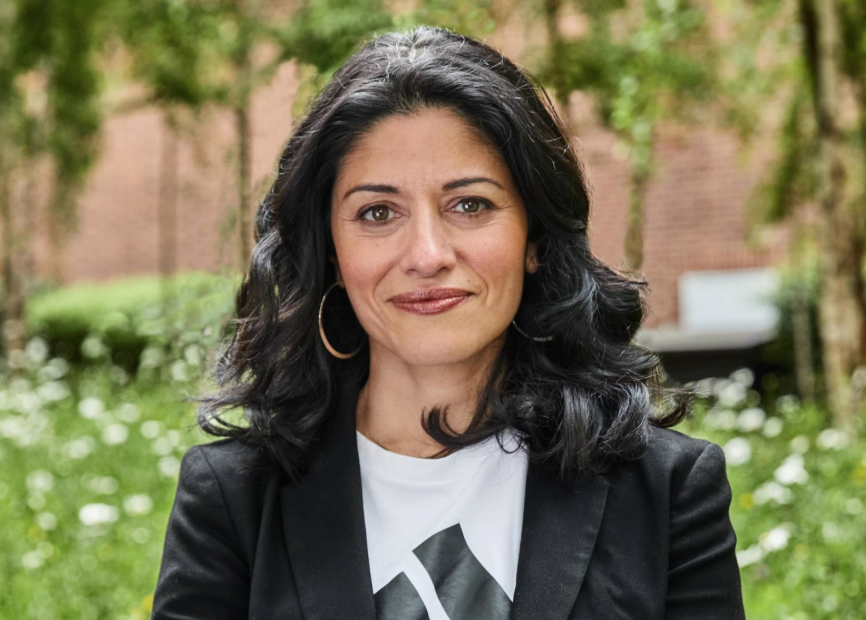Alyssa Xu: On the Rhodes of Sincerity
Alyssa Xu’s path from rural New Brunswick, Canada, to the rarefied ranks of Rhodes Scholars is not just a story of talent and triumph, but of luminous sincerity, fierce curiosity, and a devotion to seeing — and serving — those most often unseen.

Alyssa Xu ’25 spent last summer in a small mobile home, its interiors gutted like a hospital ship, roaming city to city: from Northampton, across Springfield, to Holyoke. Her job at the Tapestry health clinic was to help “recovering and current drug users” get back on their feet, distributing first aid kits, hygiene supplies, and other essentials like food and water. At first, the experience was, as Xu described it, “quite frankly, terrifying.” The space was hard to navigate, filled with the shuffling of exhausted doctors and the gnarled realities of addiction and loss. “I had no idea where to stand — I constantly felt like I was in the way,” she recalled.
Over the next few weeks, though, something shifted. Her nerves transformed — almost imperceptibly at first — into a strange sort of calm. By midsummer, she found herself not only navigating the cramped, gutted space with something approaching grace, but also discovering, to her own mild astonishment, that both staff and participants had begun to treat her as if she belonged.
At ease, her ambitions crystallized — she wanted to be a Rhodes Scholar. “I saw firsthand the individuals most overlooked by the medical field,” Xu said. “I had a lot of conversations about the ways that [care] could be improved. [It was] honestly the biggest reason why I was drawn to the Rhodes.” Indeed, upon viewing the qualities detailed on the fellowship’s website, such as “duty to service, duty to be honest, and duty to use one’s talents to the fullest,” it became clear — “Yeah, this is what I wanna do with my life,” she said.
***
I interviewed Xu over Zoom for an hour and a half in late April, just after she finished her thesis on zebrafish and human hair cells. There are a few things that are immediately impressive about her: one, she’s a frontline hockey star on the best team in the NESCAC; two, she’s a pre-med student with a near-perfect GPA; and three, she’s a 2025 Rhodes Scholar — one of only 11 hailing from Canada. She is, by any halfway objective or even wholly subjective measure, absurdly — almost ludicrously — successful. Normal people aren’t Rhodes Scholars; famed politicians and renowned scientists are. Bill Clinton, Pete Buttigieg, and Wes Moore were all Rhodes Scholars. So was Edwin Hubble, the visionary behind extragalactic astronomy, and Howard Florey, the Nobel laureate who first purified penicillin. All of these wunderkinds, in one way or another, seem to radiate (and define) the familiar, preternatural image of the Rhodes.
What’s the cost, then, to be a part of this group? What does it take? What do you have to lose, or believe in, to earn the most prestigious fellowship on planet Earth? These were all questions I hoped to explore as we spoke — not just about achievements and accolades but about the primordial soup of experiences, challenges, and anxieties that helped shape one member of the next generation’s elite.
***
Xu grew up in the rural woods of Bayside, New Brunswick, Canada. “In a place like Bayside, you end up knowing people on such a deeper level than just passing them once and, you know, kind of forgetting about it,” Xu said. “I think I learned what it meant to care about someone growing up there.”
The word “community” here really means something gorgeously, stubbornly granular: strangers aren’t allowed to stay strangers, for better, but also sometimes for worse. Xu is the daughter of Chinese immigrants, and Bayside is historically and predominantly white. “[My parents] didn’t speak English very well,” she said. “They weren’t part of this community that’s been around for hundreds of years, where grandparents were friends with each other and their great grandparents were, you know, high school sweethearts or something like that … My parents were coming into this community and they really knew no one.”
With effort, though, Xu’s parents enrolled her in sports, chess club, and even Chinese language school, allowing her to make friends while keeping her heritage. “I was glad I could be integrated into the community,” she told me. I sensed a subtext here: not regret (far from it), but awareness that these integrations often wound up being less about belonging and more about learning when to speak up, and when to make yourself invisible.
This balance, seemingly, allowed Xu to notice the stories that were told, and the stories that got lost or went unsaid. While Xu isn’t a fiction writer, she does have an affinity for stories. “Maybe that’s why I’m so drawn to communities,” she said. “Within a community, everyone has a story, and I think it’s so cool to get to know everyone’s unique background.” If growing up on the fringes of Bayside meant learning how to blend in when necessary — or, at other times, how to gently press her way to the center — it also gave her the ability to listen closely to the background hum of human entropy.
Such attentive listening has quietly shaped Xu’s perspective in her chosen field. “I think a humanistic approach [to medicine] is so important because it’s not just about a single moment — one test result or one set of blood work shouldn’t determine everything,” she said. “Making a medical decision is important, but there’s another side to it: Every blood test is part of a larger story. You’re getting to know a person, understanding what’s important to them. Seeing the whole story — from beginning to end — is essential.”
***
Xu started working on her Rhodes application in August, with the deadline at the end of September. A Rhodes application has three main components: a written supplement (roughly three pages), a CV, and six letters of recommendation. She asked her hockey coach, her supervisor from the mobile health clinic, and four professors for recommendations. Li Zhang, assistant professor of sociology and environmental studies, shared her letter with me. “Alyssa is more advanced academically and personally more mature than most junior and even senior students,” she wrote. “[A]mong the 113 students I taught at Amherst College, 180+ students I taught at UC Irvine, and 60+ students I taught elsewhere, Alyssa rates among the top 3% in terms of her outstanding academic performance and interpersonal skills.”
Xu heard back from the Rhodes Trust in October. In a few paragraphs, they invited her for an interview near her home in the Maritimes. “She just texted me and said, ‘I got it,’” her hockey teammate Tammy Zhu ’27 told me. “She is probably the most humble person I know. When she went to interview for the final round of the Rhodes Scholarship … she told the team … that she was going to interview for a ‘small scholarship thing.’ Nobody knew for the longest time the magnitude of [the] award and how hard she had worked to prepare for [it] while balancing school and hockey.” As Xu scrolled her phone in the early hours of that October morning, she faced one more surprise, her childhood best friend — Claire Wilbur — was also selected as a finalist. It was “an emotional rollercoaster,” Xu said. That weekend, the pair carpooled to the finalist event in Charlottetown on Prince Edward Island in Canada.
***
I can only imagine the anxiety Xu must have felt. Throughout our discussion, Xu repeatedly reiterated that she is a “bad interview.”
“I am a terrible, terrible interview,” she told me. I’ve interviewed enough people at this point to differentiate between a good and a bad interview. Some folks are like Wikipedia pages. Their thoughts are the clickable links, erroneous dates, and dodgy data points, scattered like signposts across the screen. Others, though, are like peer-reviewed journals. Their thoughts are the distilled record, the careful prose, and the delicate details arranged carefully for examination. Safe to say, Xu was the latter. “You’re a pretty good interview,” I told her.

Learning more about Xu, I started to feel like we were kindred, albeit disjointed, spirits. Her thesis worked with zebrafish; I worked with them at an aquarium store in Connecticut. While she analyzed their brain patterns, I sold them to customers. Her zebrafish were small — almost embryonic — while mine were grown, outfitted with fancy tails and curvy blue stripes. In parallel, Xu plays hockey, annually suiting up for months of collaborative physical exertion, while I write about it — alone — in the confines of Frost Library or the comfort of my own dormitory.
At that, whereas my migraines have always brought me nothing but despair, a forced departure from my high school soccer team, and three extra pills each morning, Xu credits her migraines with sparking her interest in neuroscience (now her major). Recalling her first explicit migraine at age 14, she described experiencing immense pain and anxiety: “I had the symptoms of a stroke, and then I had the physical panic of, oh my gosh, am I having a stroke?!” It was this moment, she explained, that inspired her not only to learn more about the brain, but also to consider the broader societal structures that shape illness.
***
For better or worse, any promise of an uneventful weekend has long unraveled by this point. You encounter a round table with six chairs on one side, filled with famed economists, scientists, and authors. On the other side, you see a single empty chair reserved for one soul – you. It’s a classic “hot seat” setup: intimidating by design, meant to parse not just what you know, but who you are under pressure. For 45 minutes, Xu — equal parts terrified and exhilarated — became a war machine, fending off questions rocketed off like artillery shells. “It was pretty back and forth,” she said. “[T]hey would start with one topic, jump to another one, and then come back and return to another scenario within the same question … it was very unpredictable.”
Hours later, Xu got the call. “It was so early,” she said. “They told us it would be around 7 p.m., and they called around five. So I thought, ‘oh, they’re trying to knock off all the rejections,’ so I let it ring a couple of times, but then I was like, ‘Ugh, I just gotta face it.’”
From the outside looking in, it’s hard to imagine how she felt. Whatever the outcome, it was the culmination of a decade of hard work, introspection, and character-building. Finally, she picked up the phone:
“We have a lot of phone calls to make today,” they said, “but this is one of the good ones. You wanna be a Rhodes Scholar?”
Xu accepted, hung up, and smiled.
***
It was 10 p.m. now, and we were both tired. “How are you different from when you got to Amherst?” I asked her in closing. “I really had no idea what my niche was or what made me special when I got here,” she said. “I was definitely passionate about helping people and interested in medicine and healthcare. But beyond that, I honestly had no idea.”
As a spectator in this story, it is tempting to fall into the trap of the Übermensch — the idea that Xu, and others like her — are somehow superhuman; born and bred for greatness, destined for accolades, and willing to sacrifice anything to succeed. Honestly, only now do I realize that Xu is not singular because she charted a linear path to prestige, nor because she possesses some arcane knowledge on how to game meritocracy. Rather, she is remarkable for the very ordinariness of her beginnings, and for her willingness — over and over again — to follow her curiosity, to lean into her discomfort, and to let her fears teach rather than define her.
Whether we like it or not, we live in an age of perverse sincerity — a time when people are willing to articulate even their most abominable beliefs with a sincere kind of conviction. In a world like that, one hurtling violently and furiously toward a parody of itself every single day, Xu’s uncalculated and compassionate sincerity offers a much-needed counterpoint that I, and many others, won’t forget anytime soon. Indeed, what sticks is not the pedigree, nor the resume’s loose-leafed constellation of excellence, but the strange, stubborn radiance of one person’s sincerity — unvarnished, unafraid, and, in a world stymied by cynicism, gloriously real.





Comments ()